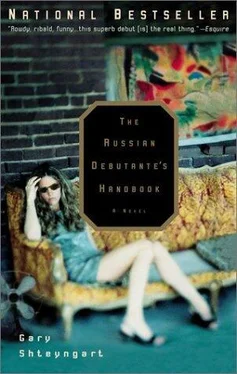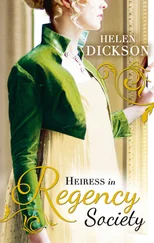Gary Shteyngart - The Russian Debutante's Handbook
Здесь есть возможность читать онлайн «Gary Shteyngart - The Russian Debutante's Handbook» весь текст электронной книги совершенно бесплатно (целиком полную версию без сокращений). В некоторых случаях можно слушать аудио, скачать через торрент в формате fb2 и присутствует краткое содержание. Город: New York, Год выпуска: 2003, ISBN: 2003, Издательство: Riverhead Books, Жанр: Современная проза, Юмористическая проза, на английском языке. Описание произведения, (предисловие) а так же отзывы посетителей доступны на портале библиотеки ЛибКат.
- Название:The Russian Debutante's Handbook
- Автор:
- Издательство:Riverhead Books
- Жанр:
- Год:2003
- Город:New York
- ISBN:0-7865-4177-6
- Рейтинг книги:4 / 5. Голосов: 1
-
Избранное:Добавить в избранное
- Отзывы:
-
Ваша оценка:
- 80
- 1
- 2
- 3
- 4
- 5
The Russian Debutante's Handbook: краткое содержание, описание и аннотация
Предлагаем к чтению аннотацию, описание, краткое содержание или предисловие (зависит от того, что написал сам автор книги «The Russian Debutante's Handbook»). Если вы не нашли необходимую информацию о книге — напишите в комментариях, мы постараемся отыскать её.
and
. The Russian Debutante’s Handbook Bursting with wit, humor, and rare insight,
is both a highly imaginative romp and a serious exploration of what it means to be an immigrant in America.
The Russian Debutante's Handbook — читать онлайн бесплатно полную книгу (весь текст) целиком
Ниже представлен текст книги, разбитый по страницам. Система сохранения места последней прочитанной страницы, позволяет с удобством читать онлайн бесплатно книгу «The Russian Debutante's Handbook», без необходимости каждый раз заново искать на чём Вы остановились. Поставьте закладку, и сможете в любой момент перейти на страницу, на которой закончили чтение.
Интервал:
Закладка:
This thought, in particular, makes him smile, and he stops in the middle of the square and puts his hand up to his nose, the one that had recently gone inside his new lover’s utilitarian cotton underwear, had even gotten a rash from rubbing against its harsh elastic strap, then sniffs his other hand to compare. What animal smells she harbors, that sleek, soignée Chicagoan with her fashionable pageboy cut and strong Marxish opinions.
Ave Maria! It is the first time he had put his hand inside there. He has always imagined the first time would be with some castoff, a large, insipid girl even more scared then he was. Now everything has changed. Now he is standing in the middle of the square, rethinking it all, calculating his bounty with different functions: subtracting Leningrad, dividing by Baobab, adding the Chicagoan, and multiplying it all by his nascent ability to shed his past and become Educated American Man, one bored but ultimately happy superhero.
That pleasant moment in the town square lasts so long that he will remember it even when the particulars of his first tussle with another’s genitalia will lose their distinctness. He will remember it just so: the birds confused by the weather chirping away, clinging to the leafless trees whose branches creak and tremble under the birds’ weight as if they, too, are being reanimated by the warmth; the bare copses, regal and long, stretching the length of the college’s ivied, pink-granite cathedral, recently reformed into a godless student union; the neo-Victorian turrets of the humanities building, once bustling with Pynchonites and Achebians, now abandoned to the intellectual ennui that settles in by spring term. Yes, this apparition, this beautiful and unlikely flora and fauna are finally his. Vladimir College, founded 1981, by the last wave of hopeful Leningrad Grain Jews disembarking at JFK and penetrating a thousand versts inland to mingle their sons and daughters with the new world’s soft and fuzzy liberal elite. Thank you Momma and Poppa Girshkin for the $25,000 per year in tuition and costs. It will all work out in the end. I will not be a disappointment.
He makes sure he is the only person standing in the square’s brief morning light, then embraces himself tightly the way he imagines the Chicagoan will do all night when she falls completely in love with him, when they begin to hammer out their plans of marriage after graduation. So far, they have spent their first night in a supine position, mostly out of the embarrassment of facing each other in bed, and he has developed all sorts of aches from the unfamiliarity of her grounded mattress. But he takes the pain in stride as evidence of his adventure, and, for the time being, he cannot imagine love’s other malevolent pains, the vast penalties for casual infractions and trust misplaced. Although, truth be told, this particular ache hurts like hell too. And so he decides to head to his own dormitory, to his kind and sedulous Jewish roommate from Pittsburgh who will not be loath to fire up the bong on a special occasion like this. And then to get some sleep, finally.
HE OPENED HISeyes for a moment of incalculable brevity, then closed them as the weight of his eyelids had become oppressive. In the darkness the pain seemed disseminated, a condition common to every part of his body as opposed to the several sites that through cast and bandage had been designated ground zero. But what he saw, in that burst of light and cognizance, was more than he needed to see. A cracked, mildewed tile, its hue a green, which undermined all greenness. Imagine a plant has been taken to a dank factory basement and there taught to reject all it once treasured—the air, the dew, the light and the chlorophyll—until the wilted thing resigns itself to making friends with the basement boiler. And then, in that instant, over that chipped, malformed tile, the outline of a fan blade passed with an anguished whoosh. A slow and ancient fan, its contours bulbous like the rear of a Studebaker.
He knew then the reality of the matter. Not the Midwest’s gray sky above him, but Stolovaya’s. And he remembered his last thought before he had lost consciousness, the graceless final option of a man without a country: Escape. He could already imagine his getaway plane, which, under the influence of the dated ceiling fan, had become a silver Trans-World stratoliner, its four propellers buzzing past sepia-toned clouds with thirty passengers and five crew members, headed for La Guardia Field.
His woke up to find his wrist warm, as if a localized fever had struck. This feeling was particularly disconcerting because south of the wrist lay a heavily anaesthetized void: his hand, likely a jumble of straight things twisted and smooth enclosures undone, no Trans-World stratoliner, rather the modern wreckage of a Boeing in a scrub field, bodies scattered about.
Morgan had slipped a hand around his wrist. She was pressing her index finger into it, measuring the pulse. She had on a straw hat with a daisy, beneath which her face was not just sad, but of a sadness—that is, sad and luminous. Her unpainted lips were chapped from worried nail-biting, a distant approximation of Vladimir’s lips split by a boot. Immediately, Vladimir deduced that the hat with the daisy was as much an effort to seem unaged by this experience as an attempt at levity for his benefit.
“Morgie,” he said. And then he remembered what this was all about. “I live.”
“You’re going to live a long time,” she said, maneuvering around the bandages to kiss his nose. “We’re both going to live a long time. And be happy, too.”
And be happy, too. Vladimir closed his eyes and considered this. It almost didn’t matter if she was right or wrong. He took in a deep breath, as deep as he could with his lungs brushing against surfaces ruptured and organs impaired. She smelled salty and vital. Her hat fell off as she leaned over him and a curtain of hair brushed against his face, some getting trapped in his hungry nose.
“I live,” Vladimir said, squeezing tight the fist that had survived.
TWENTY MINUTES INTOhis visit, Kostya was still pulling out apricots and bananas, along with dozens of mortally wounded local violets and gardenias from the outdoor market. He set up this harvest on the sills of Vladimir’s twin windows, which looked out onto a silent New Town back street, bowing all the while as if he were offering sacrifices to a gilded Buddha.
Kostya had already apologized, professed his innocence, and crossed himself a thousand times. He had read Vladimir a letter from the Groundhog, written in a half-literate Russian, a letter whose gist was: “We men, if we must to be called men, must not let slights go unpunished.”
The slight was then specified: “My poor, sick father…How could you betray him? And after all he has had to live through: Marriage and immigration, the Soviet navy and the American projects, the Stalin years and the early 90s recession. And I was no blessing as a kid, either, as you can imagine.”
A settlement was offered: “We have fixed each other good, Vladimir. But now everything is solved and ended. Now we have work to do. There must be no more hurting and beating, only friendship and respect. You will heal and then we will go to the restaurant where you sang so well and I will pay for the dinner and wine.”
And finally a postscript: “I could have had them kill you.”
Kostya removed the last piece of fruit from his gym bag. He polished the apple with his hankie and carefully placed it on Vladimir’s stomach. “Eat it immediately,” he said. “This kind of apple quickly turns brown on the inside.” He must have seen in this a fitting analogy for himself, for he clasped his hands to his powerful stomach, as if shoring up his guts, and said, “My God, those animals! They will suffer tenfold for this when their time of reckoning comes. And they will suffer eternally. Although it must be said, if one is to speak truthfully, that you have sinned against them as well, Vladimir. You have betrayed the trust of an old man. Of an invalid! And as for the Groundhog… he pays us handsomely, no? For all his pathologies, he is a kind man in his own right. And mostly he treats us like brothers.”
Читать дальшеИнтервал:
Закладка:
Похожие книги на «The Russian Debutante's Handbook»
Представляем Вашему вниманию похожие книги на «The Russian Debutante's Handbook» списком для выбора. Мы отобрали схожую по названию и смыслу литературу в надежде предоставить читателям больше вариантов отыскать новые, интересные, ещё непрочитанные произведения.
Обсуждение, отзывы о книге «The Russian Debutante's Handbook» и просто собственные мнения читателей. Оставьте ваши комментарии, напишите, что Вы думаете о произведении, его смысле или главных героях. Укажите что конкретно понравилось, а что нет, и почему Вы так считаете.












